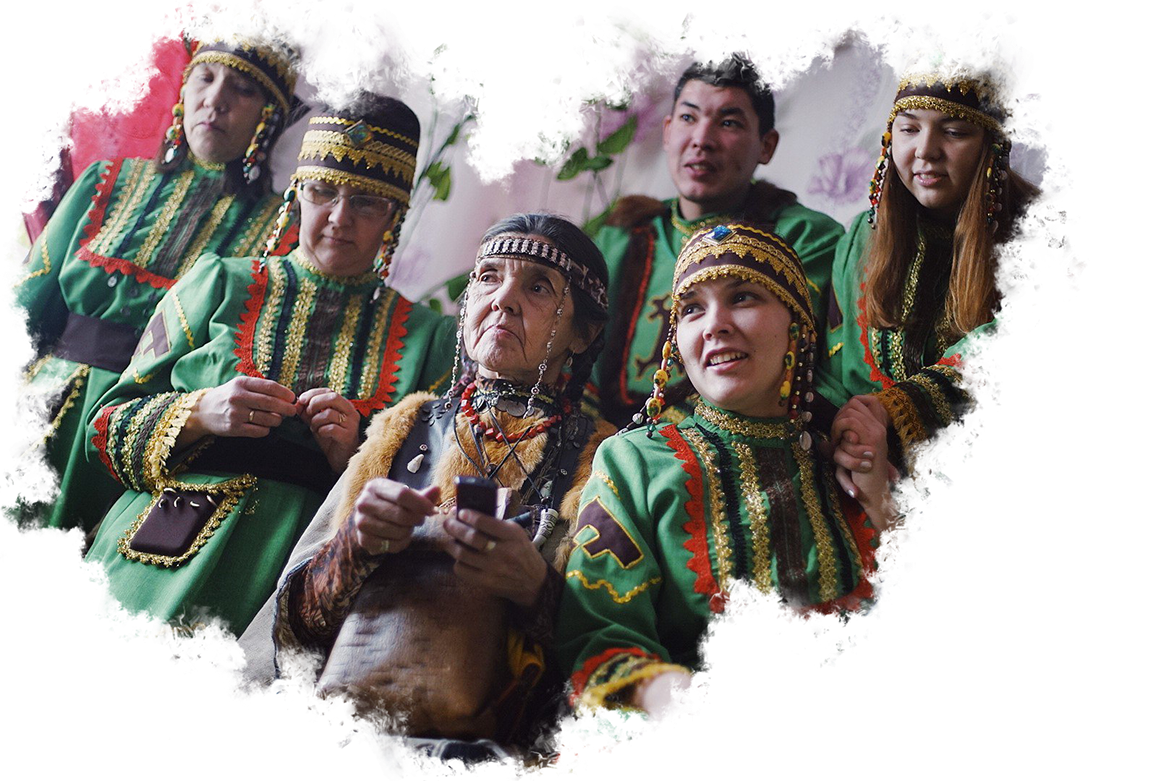
Family Matters
Stories from three women of the oldest Selkup family
en
The Selkups:
save as...
About
the Project
CONTEXT
TRADITIONS
TROUBLES
atal'ya Platonovna Izhenbina and her niece Elena meet us to take to the Tat'yana’s, Natal'ya’s sister, home.
— My house is the opposite, — says Elena, — so it’s on my way home, and Natal'ya lives two houses from here.
It seems that the Izhenbins are the single organism. The members of the family visit each other regularly, get together at the weekends, have a tradition to make ukha (traditional Russian fish soup — translator's note) on New Year's Eve… Six people came to Tatiana’s home to talk to us. It's common to see so many people in her house though.
— You must be hungry.
In front of us, Tatiana puts a plate with fish, boiled potatoes, several small bowls with jam and marmalade, butter, and bread on the table…
Natal'ya Platonovna suggests to bring national costumes, Selkup ABC book, and show us how to make small protective dolls the next day.
— Maybe, we shall go to Baba Polya in the morning? We will introduce you. She is the oldest Selkup woman here.
text:
Valeria
Chebitko
photo:
Lyubov Borisova,
Taisia Vorontsova
N
Platonida Sergeevna Izhenbina
(Baba Polya)
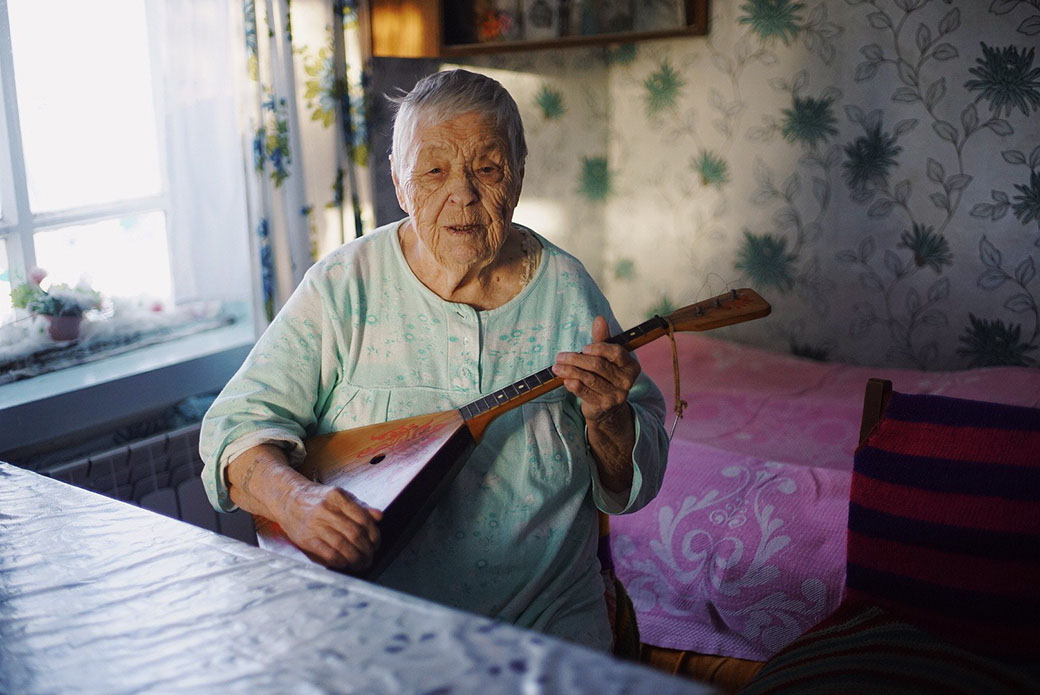
Baba Polya takes the balalaika and complains that the fingers no longer remember how to play. She tries a couple of chords… and starts singing a ditty.
— In wartime, hardly ever did I stay at home in the summer: I mowed at a grass-mowing machine and in the field, raked, stacked, and even was a cook in the field...
Platonida Sergeevna turned 90 this year. On the walls in every room of her plain wooden house, there are old family photos. There are knitted “circles” on the chairs and tables, which were made by Baba Polya (a short name used by her relatives; baba stands for grandma — TN) herself. A wooden spoon, a shovel, and a hammer for meat chopping hang over the sink…
— This all is made by my son, Viktor. He worked as a bomber and made them during his shifts. Oars, stools, different bowls… But there is almost nothing left at home. Natal'ya has taken everything to the museum.
Over the bed, there's a balalaika. Baba Polya told that she had learned how to play it when she was young.
— You can learn everything when you're unmarried. What else do you have to do? In the spring, when the snow melted, we went together across the Pur'yanga (a river in Ivankino) and sang songs.
Baba Polya takes the balalaika and complains that the fingers no longer remember how to play. She tries a couple of chords… and starts singing a ditty. Firstly, in Selkup, then, the same, in Russian.
— You speak the Selkup language, don't you?
— Of course, I do! I didn’t speak Russian at all when we lived in Parabel’. My mother didn’t have time to look after us when we moved to Ivankino, and I had to give up speaking Ostyak. Everyone spoke Russian around, that's how
I started speaking.
Baba Polya’s family moved to Ivankino when she was a child. Platonida started going to school there. She finished only three grades and had to stay for two years in each of them. She says that she barely knew Russian and couldn't learn poems by heart, she just wasn't able to memorize it.
And one day I was sent fishing,
and I came back and said that
I wouldn't go there again
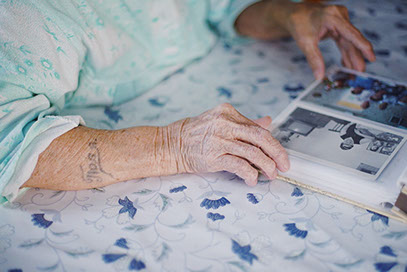
We noticed the inscription “Polya” on Baba Polya’s forearm. This is a tattoo
she made while working as a logger.
When Platonida Sergeevna was twelve, her father died. There were nine members of their family at that time and there was nobody to provide for them. Thus, Platonida started working. She didn’t get any education.
Platonida Sergeevna remembers war years full of famine and terror. The whole war she mainly worked in forest harvesting operations. She learned how to handle with saw and ax.
— I remember their bringing frozen potatoes, dumping it behind a barrack and saying: “Eat and go to cut trees down”. We were cutting a tree trunk down together with my friend. It took so long to saw it first, then to cut it off… Then we pushed it and watched it not fall down on anybody. And if you had sawed it in a crooked way, you were forced to saw it again. So much grief was then…
— And one day I was sent fishing, and I came back and said that I wouldn't go there again.
Fishing is a traditional activity for the Selkups, mostly feminine. The whole family of Izhenbins says that they still like fishing: a childhood habit.
— Our nanny used to fish all the time but I didn’t like it then and didn't like it now. Actually, I’m afraid of water,— Platonida says.
Baba Polya, as the vast majority of Selkups, doesn’t strive to talk about her nationality. You won't notice any peculiarities of the nation either in her possessions or in her daily life. During the decades of famine, there was no possibility and need to support the folk culture, and now it’s almost forgotten. And the 90-year-old woman doesn't have time for this.
Natal'ya Platonovna Izhenbina
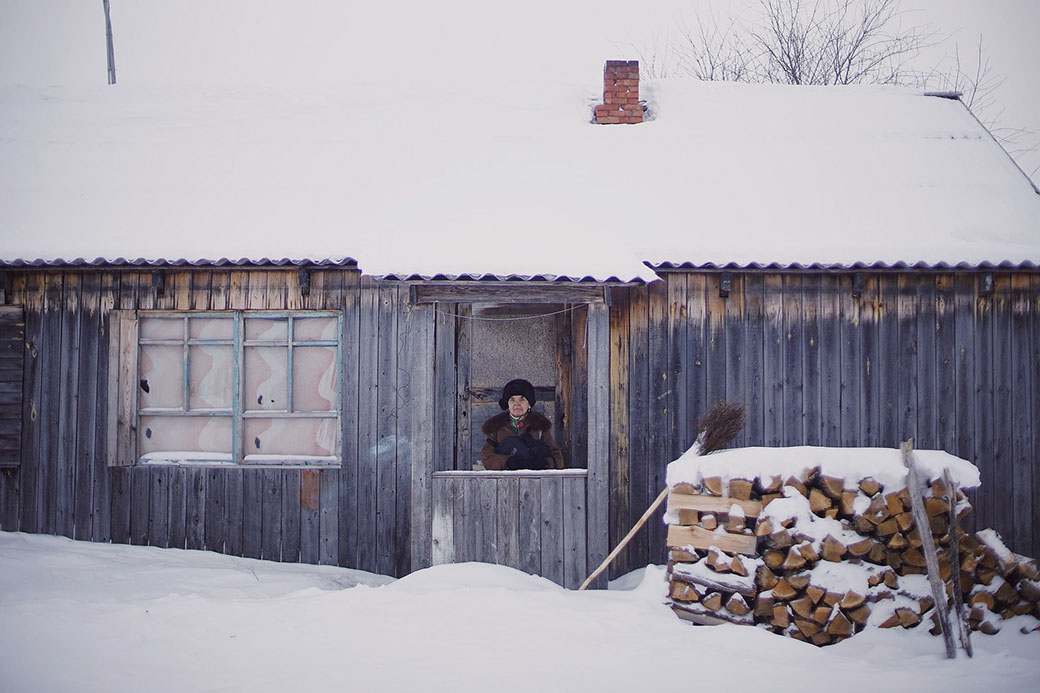
Natal'ya Platonovna lives and takes care of her wooden house by herself.
Natal'ya Platonovna is a “media” person. In nearly all reports and articles about the Selkups, you will definitely see her name. She looks just like a girl, though she is over sixty. Thin, quick, and smiley; also, she always braids her hair in two pigtails. Natal'ya often has to communicate with journalists: she is one of the main popularizers of the Selkup culture in Kolpashevo. She is willing to talk about the language, fishing, and holidays...
Natal'ya was our main guide in Kolpashevo: she organized a meeting with other Selkups, where we learned how to make a charm, explained to us
how to weave fishing nets properly, and showed us a fragment of the national dance.
— When I moved to Kolpashevo, no-one knew there who the Selkups are. I couldn't understand how it could be! This language was taught in Ivankino; I used to do it for years! So I was told that I was the only one to teach it there and now I was trying to glorify myself. But what for?
In her youth, Natal'ya couldn’t even suppose that she would tie her life with the Selkup language. Everything happened accidentally, "went with the flow" as she says. Finishing school, Natal'ya didn’t know what she would do after graduating. She was sent to Saint-Petersburg, to the Herzen State Pedagogical University of Russia.
— I studied at the Institute of the Peoples of the North and learned the Selkup language there.
— So, it turns out that you'd known some Selkup before?
— I was brought up by my grandmother, she spoke Selkup. My mother spoke fluently too but gradually stopped. Of course, I understood them but I myself spoke Russian.
The Institute for Peoples of the North — is the single higher education institution in Russia preparing teachers and scientists for more than 30 indigenous nations of the North, Siberia and the Far East. It is a branch of the Russian State Pedagogical University, founded in 1930.
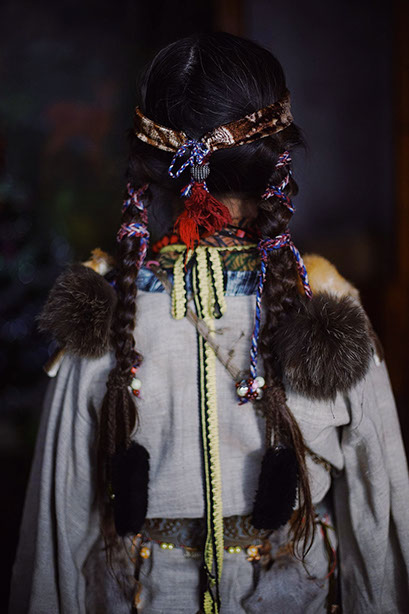

Natal'ya Platonovna always braids her hair in two pigtails. She says that Selkups have a tradition by which unmarried girls braid their hair. While two plaits signal a woman having a husband.
Natal'ya Platonovna is a “media” person.
I try to participate in all activities to prove that the language isn’t dead, it is just archived a bit. When our young people perform sketches and ask me how to pronounce something correctly, I’m sooo happy!
While Natal'ya was studying, the language was still alive in Ivankino, according to her. Every time when she came home on holidays, she recorded the samples of Selkup speech (mainly, ditties) to take them to her professors to Saint-Petersburg.
Natal'ya felt homesick. She was interested in local history since her childhood, asked her grandmother about the family and ancestors, and wrote these stories down in a notebook. Natal'ya Platonovna keeps a self-made map of Ivankino and a pile of notebooks with a fully-described bloodline, where the biographies of different generations of the Izhenbiny family are kept.
After graduation, Natal'ya dreamt about coming back to her homeland and start teaching there. But the school was closed and opened only in 1989. Natal'ya hadn't practiced the language until then and had almost forgotten it, and she returned to studying it again only in 1991.
— After opening the school, I worked as a primary school teacher. Then, in 1991, the government started to support the small peoples and the Selkup language became demanding. At that time, the municipal mayor came to me and told me that we had to do it.
Natal'ya Platonovna was afraid that she forgot everything. But there was nothing to do, and she agreed.
At that time, there was only one Selkup-speaking person in the village, an elderly Selkup woman Elizaveta Varlamovna Sychina. Natal'ya Platonovna visited her and tried to record everything she said. She felt uncomfortable to disturb an elderly woman, that’s why she was so glad when special books and manuals were brought to Ivankino. Then Natal'ya checked all the recorded stories with the help of a dictionary.
Elizaveta Sychina, born in 1923, appears in dozens of scientific articles and dissertations devoted to the Selkup language. She is one of the few who maintained the Shojkup dialect of the Selkup language at the end of the 20th century.
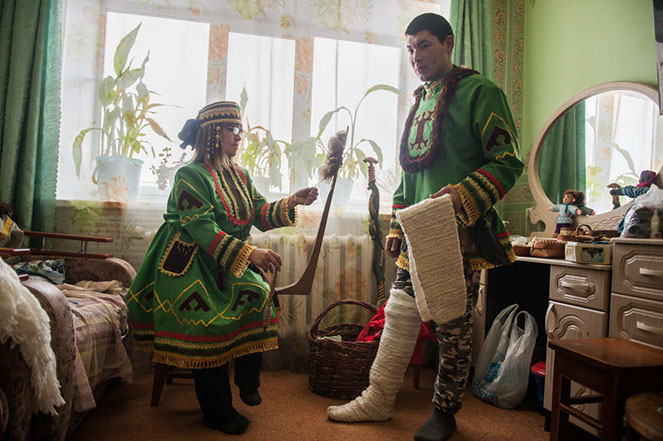
The Izhenbiny family can
use a spinster’s wheel, knit baskets, and make traditional Selkup dolls.
When Natalia’s grandmother was alive, the granddaughter recorded her speech and then listened to it to memorize the pronunciation. The Izhenbins still keep recordings on which grandma Anna tells a fairy tale in Selkup, which reminds Russian Three bears (its plot reminds the story of Goldilocks and three bears — TN). Natal'ya Platonovna still relistens to these recordings.
— I still don’t speak Selkup well because I’m afraid of speaking inaccurately: pronunciation, accent… I need to talk with other native speakers, — Natal'ya says. Although, there are only a few of them left.
— How do you promote the language?
— Every week, we hold a meeting and speak Selkup there. To be honest, it seems that nobody is really interested in preserving the language; we don't even have specially equipped premises.
The whole family helps Natal'ya to promote the Selkup culture. They often hold celebrations, exhibitions, and festivals in Kolpashevo and all over Tomsk Oblast. Natal'ya’s daughter, Lyuba, organizes everything and Natal'ya Platonovna consults her. She knows many Selkup legends, can tell you how to celebrate Selkup New Year and why coins are used for decoration on Selkup folk costumes. During the holidays, Natal'ya conducts all the rites properly.
— I try to participate in all activities to prove that the language isn’t dead, it is just archived a bit. When our young people perform sketches and ask me how to pronounce something correctly, I’m sooo happy! — Natal'ya says.
Lyubov Izhenbina
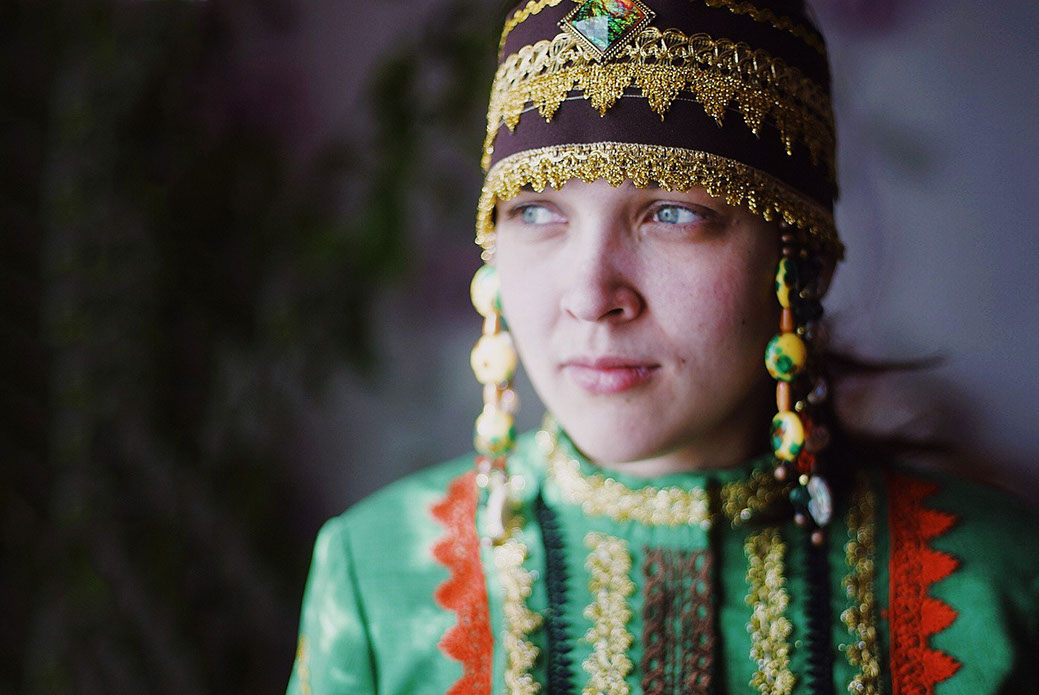
Lyuba, 28, treated us like old friends, so she spoke frankly.
A 28-year-old woman, Lyuba, meet us in a town unknown to us, gives us breakfast, and treats us like old friends; that's why she speaks with us frankly:
— I know Russian at D and I’m not ashamed of it. Once I was asked to write a sentence on a blackboard and I wrote it in Selkup.
Lyuba grew up in Ivankino. When she was a little girl, Ivankino just got the status of a national settlement. In the village, everyone spoke Russian, but journalists and scientists often came to them, "kept a census of the population." According to them, at that time only one Russian family lived
in Ivankino.
Lyuba’s mother taught Selkup language, and Lyuba followed her everywhere. She went fishing with her father and was upset when he went fishing without her, rode the oblasok (a dugout Selkup boat — TN). She still remembers how they celebrated Selkup New Year in August.
But I don’t accept Russians because I understand that if we break through and become famous, it will be offensive. There are few Selkups left
— Some people know the poems of Agniya Barto and Samuil Marshak from the early ages, while I know why coins are used for decoration on Selkup folk costumes. There is a legend: a God came down to the earth and met a Russian and a Selkup. In one bag, the God had paper money and in another — coins (rubles, kopecks). The Russian was smarter and got paper money, and the Selkup got coins because they were beautiful. He came home and told his wife “Look, darling, how many jewelries I brought for you.
Lyuba knows many Selkup legends and fairy tales: about a frog-savior, a loon, a bear, which is the Izhenbins' spirit animal.
— A bear lived on the heavens. Once upon a time, it misbehaved and the God sent him to the earth. The bear fell down on a tree and stuck there. He starved to death and began rotting. Worms crawled out of him. These worms are the first people of our family,— Lyubov' tells us.
A bear is depicted on their national costume as a symbol of good luck and
a talisman.
Lyuba's mother and grandmother told her these stories; she remembered them and uses in performances now.
— When I was 14, our parents sent me with my siblings to live in Kolpashevo but they stayed to work in Ivankino. In a school that was new for us, everyone tried to prove themselves: someone sang, somebody danced, others played the guitar. I also wanted to stand out, and then the idea arose to perform Selkup legends at celebrations.
Nowadays, Lyuba heads her own youth creative team. It doesn’t have any special name. Liuba calls it just “youth”. This is a group of like-minded Selkups, who studied at the same school some time ago. They gather together, plan and organize holidays, perform fairy tales and dances.
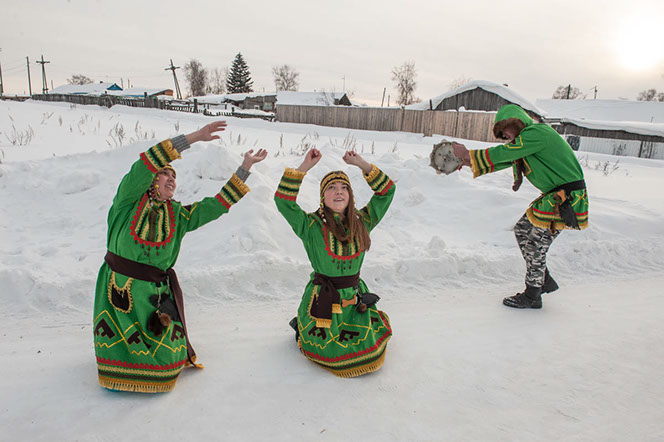
Lyuba, together with her like-minded friends, organize holidays, stage theater performances, and teach dances. Her brother Vasily and cousin Dasha help her.
— Actually, the Selkups don't have their national dances. They are more like small sketches that show our life. The most important thing is that a person, who watches these sketches, can understand what they are about, — she says.
The group doesn’t have any permanent members. There is a core of twelve people. It's not that easy to join the collective of Selkup youth.
— Adults scold me; they say I’m wicked. But I don’t accept Russians because I understand that if we break through and become famous, it will be offensive. There are few Selkups left.
Lyuba can’t answer why she decided to promote the Selkup culture in a simple way. She says she enjoys it. What's next? She doesn’t know for sure. She has a plan of events for half a year in advance.
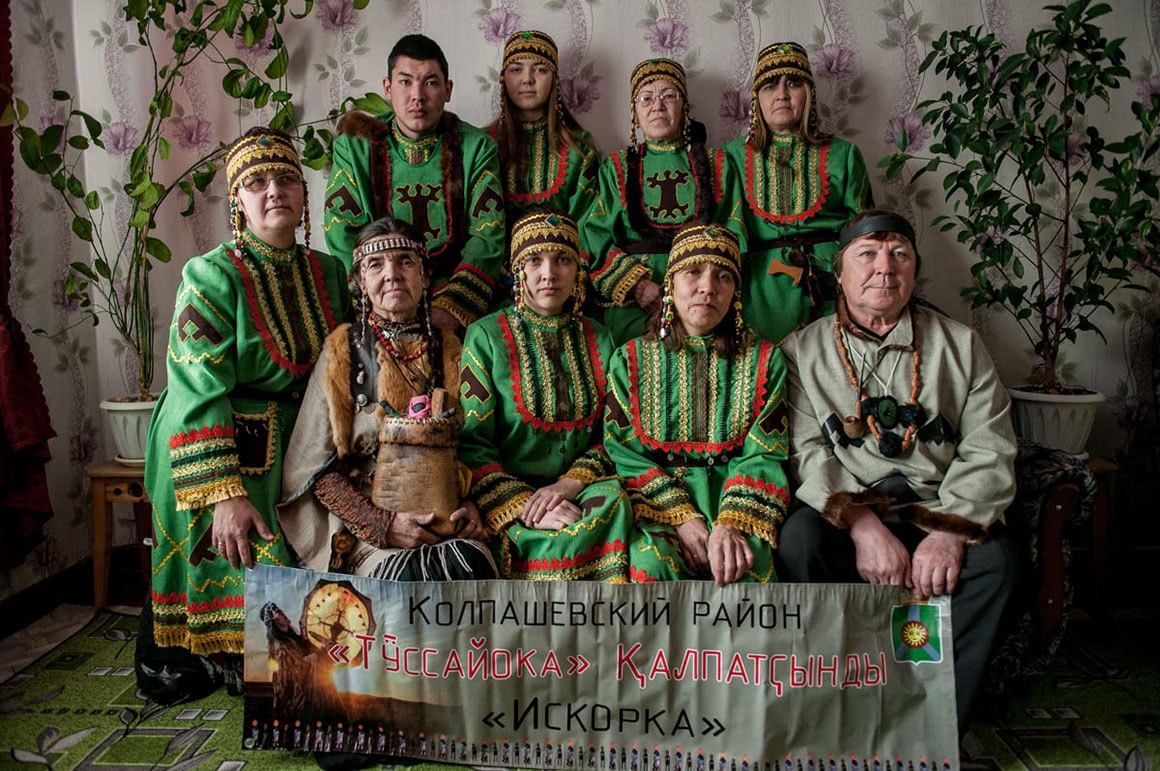
«Школа Туссайока» («туссайока» в периоде с селькупского означает «искорка») организована специально для селькупов в Колпашеве.
На занятиях школы проходят лекции о материальной и духовной культуре нарымских селькупов.